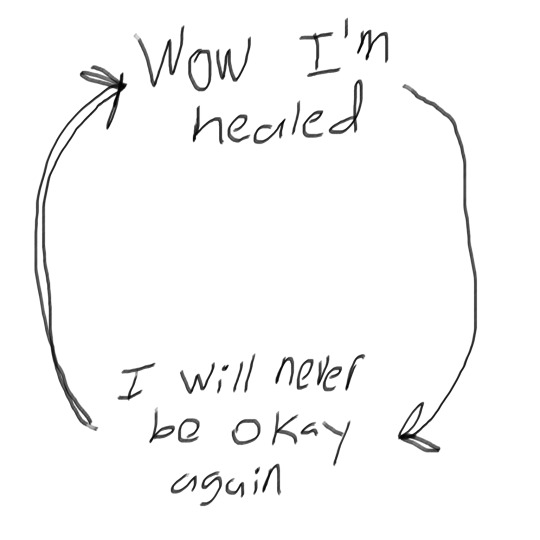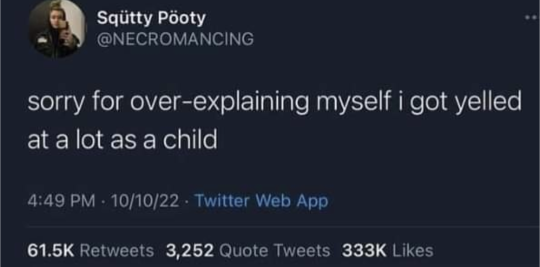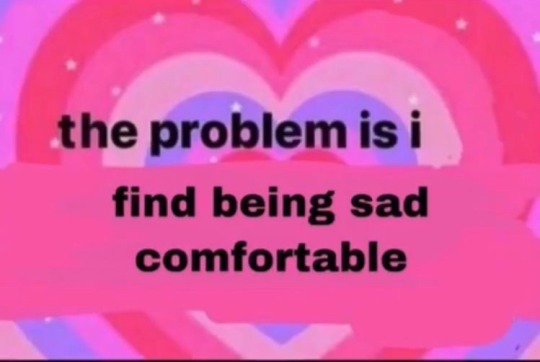Text
remember kids!: obsession turns into disgust.
2K notes
·
View notes
Text
also feeling very abandoned by my friends. why don’t they ever reach out or want to spend time with me?
88 notes
·
View notes
Text
Short Description of DBT Skills
This is just a short directory to explain, in one sentence or two, what these concepts mean, and what the use of each skill is by defining it. Come to this page if you can’t remember what IMPROVE or DEAR MAN stands for, but don’t want to have to read the long post that introduced those skills on SBD.
See the DBT Skills Masterpost for posts that go into each of these skills or sets of skills in depth.
Mindfulness Skills:
Wise Mind: The Wise Mind is the balance between Emotion Mind and Logic/Reasonable Mind
Observe: Notice without getting caught in the experience. Experience without reacting to the experience.
Describe: When a feeling or thought arises, or you act, acknowledge it with a description of the thought or action or sensation, etc. Describe to yourself what is happening and label your feelings.
Participate: Enter into your experiences, act intuitively, be completely immersed in the experience, in the present.
Non-Judgmental: See, but don’t evaluate. Focus on the “what” happened, not on what “should” or “should not” have happened.
One-Mindful: Focus on the moment–do one thing at a time and completely focus on what you are doing or whom you are with. Let go of distractions.
Effective: Do just what is necessary in a situation to achieve your goals. Focus on what works, and direct your efforts there. Act skillfully, because the more you practice acting skillfully, the more Effective you will become at attaining your goals.
Distress Tolerance Skills:
STOP: Stop, Take a step back, Observe, Proceed Mindfully
TIP: Temperature, Intense Exercise, Paced Breathing/Paired Muscle Relaxation/Progressive Muscle Relaxation (used to change your level of distress quickly)
Distract using Wise Mind ACCEPTS: Distract yourself with Activities, Contributing, Comparisons, Emotions, Pushing away, Thoughts, Sensations
Self-Soothe: Use the senses (vision, hearing, taste, smell, touch) to soothe your physical self in order to make your emotions less painful.
IMPROVE the Moment: Improve the moment with Imagery, Meaning, Prayer, Relaxation, One thing in the moment, Vacations, Encouragement
Pros and Cons: Examine the short term and long term pros and cons of acting and not acting on your urges/impulses using a chart.
Radical Acceptance/Reality Acknowledgement: Acknowledge what is, let go of fighting or denying reality. Use TURNING THE MIND to commit to acknowledgement over and over again.
Interpersonal Effectiveness Skills:
Clarified Priorities: What is most important to you in this interpersonal interaction 1) Obtaining your objective, 2) Maintaining the relationship, or 3) Maintaining your self-esteem/sense of self-worth
DEAR MAN: Describe, Express, Assert, Reinforce, stay Mindful, Appear confident, Negotiate (used for saying “no” or asking for something; obtaining your objective)
GIVE: Be Gentle, act/be Interested, Validate, use an Easy manner (used for maintaining a relationship)
FAST: Be Fair, no Apologies, Stick to values, be Truthful (used to maintain your self-esteem/sense of self-worth)
Emotion Regulation Skills:
PLEASE: For reducing vulnerability, treat PhysicaL illness, balance Eating, avoid mood-Alerting drugs (as in street drugs or non-prescription drugs), balance Sleep, get Exercise
ABC: Accumulate Positive Emotions/Experiences: For reducing vulnerabilities in the Short Term: Do pleasant things that are possible now. For reducing vulnerabilities in the Long Term: Make changes in your life so that positive events will occur more often. This helps “build a life worth living for you.”
ABC: Build Mastery: Engage in activities that make you feel competent and in control.
ABC: Cope Ahead: Cope ahead of time with emotional situations. Rehearse a plan ahead of time so that you are prepared to cope skillfully with emotional situations.
Opposite Action: Change emotions by acting opposite to current emotions/urges. Used for when emotions don’t fit the facts of a situation.
Check the Facts: Check out whether your reactions (emotional or behavioural) fit the facts of the situation. Changing beliefs and assumptions to fit the facts can help you change your emotional reactions to situations.
Problem Solve: When the facts themselves are the problem, solving emotional problems consistently and effectively will reduce the frequency of negative emotions and increase your sense of competency in regards to dealing with these emotions/urges.
-Pandora
3K notes
·
View notes
Text
*through gritted teeth* every day i choose to be kind *barely restraining myself from violence* i choose to have compassion *tamping down the vicious bloodlust inside me* i choose to care and to be kind and to love
127K notes
·
View notes
Text
it's important to realize that not everyone is going to like you and you can't please everyone no matter how much you try, but it's even more important to realize that's a good thing
3K notes
·
View notes
Text
You hate yourself so loudly. You hate yourself at the top of your lungs. Your loathing for yourself permeates your speech. “Sorry I’m just rambling.” “Don’t worry about it.” “Just ignore me.” “Sorry if I’m annoying you.” “Sorry I don’t make sense.” “Sorry about that.” Sorry, sorry, sorry. You act as if you have to beat everyone else to the punch. As if the punching bag is you. If you hate yourself first, if you hate yourself loudest, then nobody will hurt you. You clapped your hands over your ears and shut your eyes and balled yourself up so that you’d never have to experience people’s loathing for you. And it meant you never heard their love. You drowned it out. You screamed your hatred over it. And you never got to hear it.
87K notes
·
View notes
Text
one of the more valuable things I’ve learned in life as a survivor of a mentally unstable parent is that it is likely that no one has thought through it as much as you have.
no, your friend probably has not noticed they cut you off four times in this conversation.
no, your brother didn’t realize his music was that loud while you were studying.
no, your bff or S.O. doesn’t remember that you’re on a tight deadline right now.
no, no one else is paying attention to the four power dynamics at play in your friend group right now.
a habit of abused kids, especially kids with unstable parents, is the tendency to notice every little detail. We magnify small nuances into major things, largely because small nuances quickly became breaking points for parents. Managing moods, reading the room, perceiving danger in the order of words, the shift of body weight….it’s all a natural outgrowth of trying to manage unstable parents from a young age.
Here’s the thing: most people don’t do that. I’m not saying everyone else is oblivious, I’m saying the over analysis of minor nuances is a habit of abuse.
I have a rule: I do not respond to subtext. This includes guilt tripping, silent treatments, passive aggressive behavior, etc. I see it. I notice it. I even sometimes have to analyze it and take a deep breath and CHOOSE not to respond. Because whether it’s really there or just me over-reading things that actually don’t mean anything, the habit of lending credence to the part of me that sees danger in the wrong shift of body weight…that’s toxic for me. And dangerous to my relationships.
The best thing I ever did for myself and my relationships was insist upon frank communication and a categorical denial of subtext. For some people this is a moral stance. For survivors of mentally unstable parents this is a requirement of recovery.
257K notes
·
View notes
Text
I opened up asks and submission buttons if you guys want to share or ask anything 💗💗 Be safe and kind please!!
1 note
·
View note






